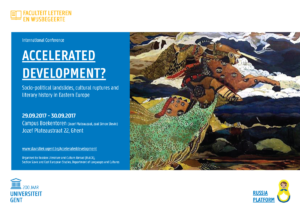
Accelerated development? Socio-political landslides, cultural ruptures and literary history in Eastern Europe
In 1964 the Bulgarian-Belarusian-Russian scholar Georgii Gachev coined the term ‘uskorennoe razvitie’ or ‘accelerated development’ in his 1964 monograph Accelerated Development of Literature: On the Basis of the Bulgarian Literature of the First Half of the 19thCentury. The term describes what happened to Bulgarian literature during Ottoman rule. Being a ‘young’ and ‘peripheral’ literature, having started to develop only recently at the time, Bulgarian literature ‘had to’ go through the whole evolution of European literature at a high pace in order to catch up with the latter. One of the side effects of this accelerated development was that characteristics of different style periods could even co-occur. Gachev’s thought-provoking idea has never really received a lot of attention, except in Bulgarian studies, where the concept was elaborated, criticized and / or gave way to new theories (Petar Dinekov, Nikolai Genchev, Roumen Daskalov, Alexander Kiossev …), but mostly with regard to the development of Bulgarian culture and society.
Today Gachev’s theory seems outdated, not in the least for its centralist assumptions – i.e. taking for granted that central cultures take the lead and peripheral cultures follow suit – that form the very basis of the Eurocentric theory. Nonetheless, the potential of the very kernel of the concept is obvious – both for dealing with the literary histories of other ‘young’ and/or ‘peripheral’ literatures in different time periods and for challenging the different notions that form the basis of Gachev’s theory – ‘peripheral’, ‘young’, ‘Western’, ‘dominant’, ‘oppression’, ‘conservatism’. ‘Accelerated development’ may be a suitable term to describe how Western literary critics in the 19th century thought about the quickly evolving, ‘peripheral’ Russian literature of the time. ‘Accelerated development’ may also be applied to the evolution of (certain) Modernist movements in the ‘peripheral’ Eastern Europe. And what to say about the apparent fast-forward evolution of the East-European literatures after the collapse of Communism, quickly adapting Postmodernism, Magical Realism, and other literary trends that other, ‘central’ literatures had been going through earlier?
This conference aims to explore – i.e., to corroborate, to challenge or to further develop – the concept of accelerated development by looking at concrete cases in the literary histories of Eastern Europe where one can speak of a major rupture, such as suddenly acquired cultural independence or freedom or technological evolution, that causes the literature to change course and, possibly, to ‘accelerate’. More specifically, this conference hopes to find new ways to look at the complex relationships between dominant and non- or less-dominant, central and peripheral, old and young literatures and cultures, colonizing and colonized cultures, progressive and conservative cultures, open and oppressive / repressive cultures, etc. Additionally, the conference aims to discuss the (catalytic) role of cultural agents in the process of accelerated development and the tension(s) between literary and extra-literary motivations. Lastly, the conference hopes to shed light on how cultures going through an accelerated development look at their earlier selves and whether, and if so, how accelerated developments may also lead to new, ‘own’ literary forms that are not quite related to the seemingly dominant cultures.
Keynote speakers:Raymond Detrez (Belgium), Galin Tihanov (UK) and Willem G. Weststeijn (The Netherlands).
Organizing Committee: Ben Dhooge, Phaedra Claeys, Michel De Dobbeleer, Miglena Dikova-Milanova, Tilde Geerardyn, Russian Literature and Culture Abroad (RuLCA, Ghent University)
Scientific Committee: Nikolay Aretov (Bulgarian Academy of Sciences, Sofia), Pieter Boulogne (University of Leuven / Ghent University), Raymond Detrez (Ghent University / University of Leuven), Theo D’haen (University of Leuven), César Domínguez (University of Santiago de Compostela), Dennis Ioffe (Ghent University / University of Amsterdam), Alexander Kiossev (Sofia University), Ellen Rutten (University of Amsterdam), Ivana Živančević Sekeruš (University of Novi Sad)
Conference Venue: Campus Boekentoren: Jozef Plateauzaal & zaal Simon Stevin, Jozef Plateaustraat 22, Ghent, Belgium